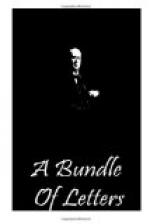The English-speaking specimens, too, I have not been willing to neglect the opportunity to examine; and among these I have paid special attention to the American varieties, of which I find here several singular examples. The two most remarkable are a young man who presents all the characteristics of a period of national decadence; reminding me strongly of some diminutive Hellenised Roman of the third century. He is an illustration of the period of culture in which the faculty of appreciation has obtained such a preponderance over that of production that the latter sinks into a kind of rank sterility, and the mental condition becomes analogous to that of a malarious bog. I learn from him that there is an immense number of Americans exactly resembling him, and that the city of Boston, indeed, is almost exclusively composed of them. (He communicated this fact very proudly, as if it were greatly to the credit of his native country; little perceiving the truly sinister impression it made upon me.)
What strikes one in it is that it is a phenomenon to the best of my knowledge—and you know what my knowledge is—unprecedented and unique in the history of mankind; the arrival of a nation at an ultimate stage of evolution without having passed through the mediate one; the passage of the fruit, in other words, from crudity to rottenness, without the interposition of a period of useful (and ornamental) ripeness. With the Americans, indeed, the crudity and the rottenness are identical and simultaneous; it is impossible to say, as in the conversation of this deplorable young man, which is one and which is the other; they are inextricably mingled. I prefer the talk of the French homunculus; it is at least more amusing.




